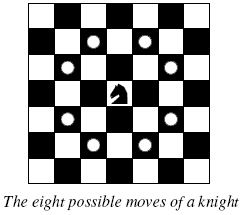POJ A Knight's Journey(DFS)
来源:互联网 发布:红轴和青轴 知乎 编辑:程序博客网 时间:2024/06/11 00:26
A Knight's Journey
Time Limit: 1000MS Memory Limit: 65536KTotal Submissions: 31324 Accepted: 10708
Description
 Background
Background The knight is getting bored of seeing the same black and white squares again and again and has decided to make a journey
around the world. Whenever a knight moves, it is two squares in one direction and one square perpendicular to this. The world of a knight is the chessboard he is living on. Our knight lives on a chessboard that has a smaller area than a regular 8 * 8 board, but it is still rectangular. Can you help this adventurous knight to make travel plans?
Problem
Find a path such that the knight visits every square once. The knight can start and end on any square of the board.
Input
The input begins with a positive integer n in the first line. The following lines contain n test cases. Each test case consists of a single line with two positive integers p and q, such that 1 <= p * q <= 26. This represents a p * q chessboard, where p describes how many different square numbers 1, . . . , p exist, q describes how many different square letters exist. These are the first q letters of the Latin alphabet: A, . . .
Output
The output for every scenario begins with a line containing "Scenario #i:", where i is the number of the scenario starting at 1. Then print a single line containing the lexicographically first path that visits all squares of the chessboard with knight moves followed by an empty line. The path should be given on a single line by concatenating the names of the visited squares. Each square name consists of a capital letter followed by a number.
If no such path exist, you should output impossible on a single line.
If no such path exist, you should output impossible on a single line.
Sample Input
31 12 34 3
Sample Output
Scenario #1:A1Scenario #2:impossibleScenario #3:A1B3C1A2B4C2A3B1C3A4B2C4
一道经典的DFS,行为1~7,列为A~G,问给定的n*m的棋盘上,马能否遍历整个棋盘(按字典序输出路径)
#include <iostream>#include <cstring>#include <cstdio>#include <stdlib.h>using namespace std;int n,m,e,bis;int xx[]= {-2,-2,-1,-1,1,1,2,2};int yy[]= {-1,1,-2,2,-2,2,-1,1};char s[15000];int b[150][150];void dfs(int x,int y){ if(bis) return ; b[x][y]=1; s[e++]=x+'A'-1; s[e++]=y+'0'; if(m*n*2 == e) { bis=1; return ; } for(int i=0; i<8; i++) { int tx=x+xx[i]; int ty=y+yy[i]; if(tx>0 && tx<=m && ty>0 && ty<=n && !b[tx][ty]) { if(!bis) { dfs(tx,ty); e=e-2; b[tx][ty]=0; } } }}int main(){ int T; cin>>T; for(int i=1; i<=T; i++) { bis=0; e=0; cin>>n>>m; memset(b,0,sizeof(b)); dfs(1,1); printf("Scenario #%d:\n",i); if(bis) printf("%s\n\n",s); else printf("impossible\n\n"); } return 0;}
0 0
- POJ A Knight's Journey(DFS)
- POJ 2488 A Knight's Journey DFS
- POJ 2488 A Knight's Journey (dfs)
- A Knight's Journey poj DFS
- POJ《A Knight's Journey》方法:DFS
- POJ 2488 A Knight's Journey(DFS)
- POJ 2488 A Knight's Journey DFS
- POJ 2488 - A Knight's Journey (DFS)
- POJ 2488 A Knight's Journey【DFS】
- poj 2488 A Knight's Journey (Dfs)
- A Knight's Journey (poj 2488 DFS)
- Poj 2488 A Knight's Journey(Dfs)
- POJ 2488-A Knight's Journey(dfs)
- POJ 2488 A Knight's Journey --- DFS
- poj 2488 A Knight's Journey(DFS)
- POJ-2488-A Knight's Journey-DFS
- POJ 2488 A Knight's Journey(DFS)
- poj 2488 A Knight's Journey(DFS)
- YUIcompressor批处理压缩js和css
- IOS textField、textView输入框的自适应
- 《周鸿祎自述》新书发布会十大经典语录
- info.plist文件的设置
- leetcode - Partition List
- POJ A Knight's Journey(DFS)
- 基于HTTP的多文件上传问题
- Java HashMap源代码详解
- PAT 1006. Sign In and Sign Out (25)
- JSP学习笔记1--初步接触JSP与JSP内置对象
- sublime
- Partitioning by Palindromes(回文串-->字符串DP)
- 漫谈拖延
- Block


